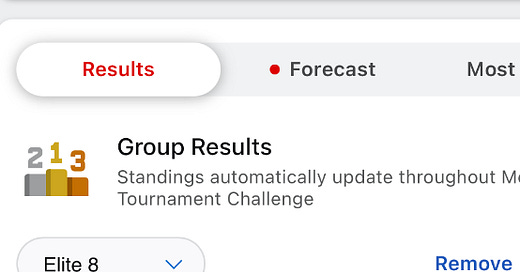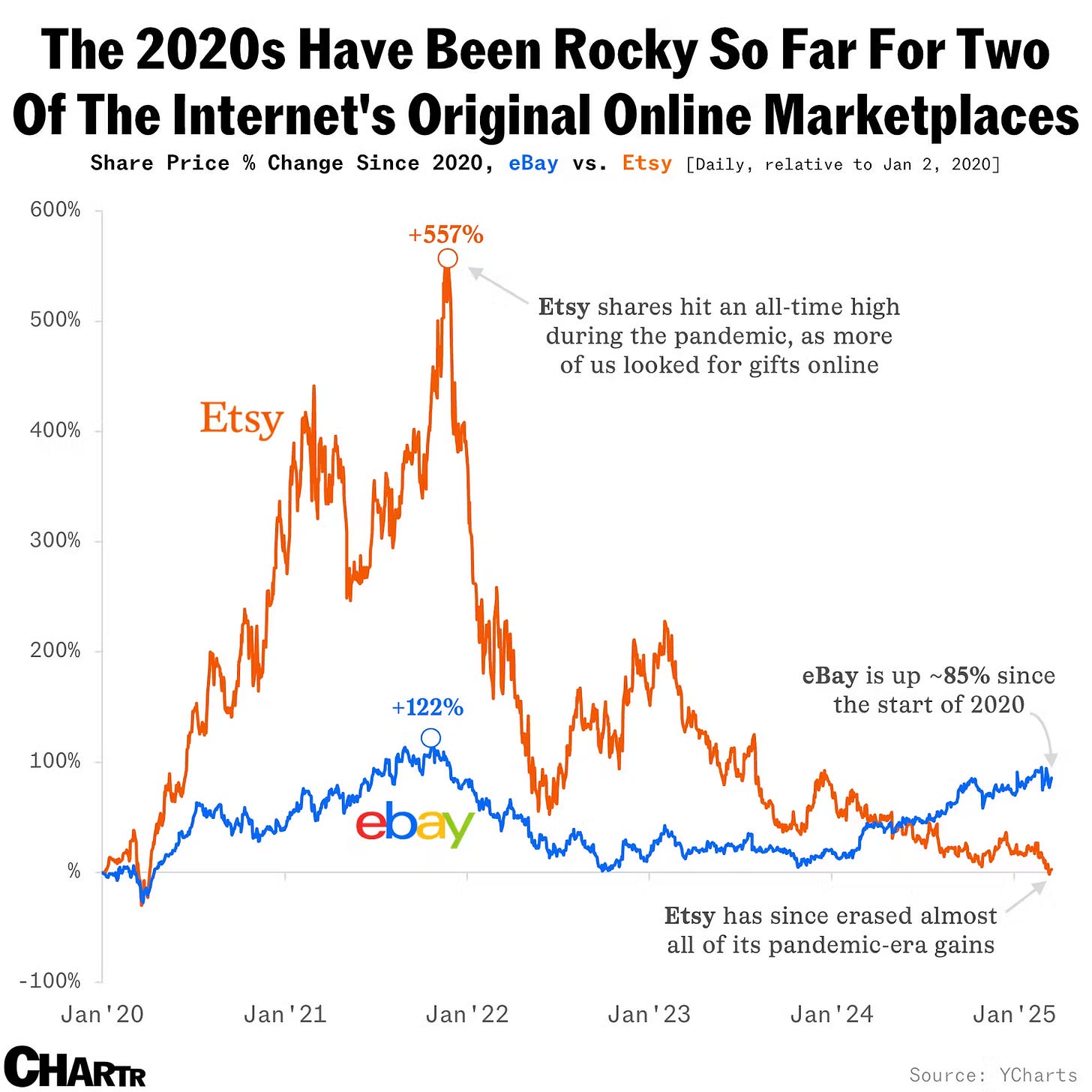The March Madness of It All
State of Feb/March. I used ChatGPT to title this post and I kind of like it?
The shortest and now seemingly longest (March) months of the year remind us that things these days are mostly not as they seem. A 79-degrees Saturday can drop to 53 and windy in an hour. New Yorkers, I am here to validate the ever bizarre cold rush you felt last Saturday. And in other record breaking ups-and-downs, the S&P 500 hit a price index high on mid February only to fall 10+% in March — March was its worst month since 2022.
Life as we know it has never been more… anxious. All kinds of surveys and studies have come out spotlighting low consumer confidence in today’s turbulent economy (some examples here and here), sentiment that festers (as anxiety does) into all other facets of life including but not limited to: stress-googling “recession”, speaking French while on a trip in Mexico City to not come across as American, or rather simply canceling the trip altogether.
In this recent New York Times (NYT) article Cameron Hewitt of Rick Steves’ Europe, an American guidebook and tour company, shares:
The fear that people in other countries will equate them with their politicians’ actions is a peculiarly American anxiety…
Political beliefs feel like a largely American-grasped form of identity, in lieu of shared ethnicity, prehistory, or religion as with other countries… More on this later.
Other behaviors of late: stressing about hair falling out, worrying about the job market 12 months out, applying to law school or business school to not worry about the job market 12 months out. The emotional rollercoaster that has been TikTok and it’s impending ban, an app that... you guessed it: stresses people out. The Catch-22 of sorts is the very existence of TikTok's latest viral dance trend to Doechii's song "Anxiety".
If you squint hard enough it’s the 1950’s… we’re wearing longer skirts (hemline index theory, NYT’s Hank Sanders cites an amazing 1982 NYT archive on this in this equally amazing #recessionindicator article), treating most dress codes as “business casual” (Stella McCartney FW25 runway acknowledges this), and listening on repeat to the ultimate crooner (Bruno Mars at No. 1, ”Die With a Smile” hits a 121-day Spotify record).
For the most part American anxiety is well-founded. Inflation has somewhat eased but businesses are anxious too: cutting costs, cutting labor, raising prices (stay up to date here) to stay afloat in preparation for tariffs. An oddly coincidental byproduct of this? The proliferation of members clubs: charge the wealthy for a dark velvet space and exclusivity — Hell, even access to the United Airlines airport lounge. Everything feels expensive. I’m just grateful my egg sensitivity has done me some good.
And yet somehow… “America has never been wealthier” in illiquid assets (home prices, stock portfolios), healthier (GLP-1s, saunas, a $2B better-for-you soda), more innovative (the US has the most AI startups that have raised >$1B in ‘24 (71%), China is 2nd with 12.5%.).
Some recent qualms debunked to free some headspace:
Are there more plane crashes these days? Data tells us no. Media shows us the impact of repeated real-time coverage on high profile crashes, not to mention the scarred American association with planes as a result of NYSE: BA.
Are more tech founders defrauding investors? We’re witnessing 1) the conclusion of long-drawn jury verdicts on buzzy startups from the 2021 VC bubble (Frank, Byju, Aspiration) and 2) Trump’s spree of pardons (Nikola Motors, Ozy Media, BitMEX) that seem all too personal. But with lots of capital pumped into the asset class, IPO and M&A markets largely closed, and a lack of distributions, investors are likely feeling extra careful and extra litigious about their bets.
If consumer sentiment has dropped, are people not spending on luxury? Estee Lauder’s <7k job cuts seem to say so. I’d argue spend has evolved to littler luxuries: premium movie theater experiences (AMC is doubling down on Dolby), lymphatic drainage massages, a floral blossom yuzu matcha refresher made by Muji’s robot barista (the longer the name the better), high tea at Louis Vuitton’s library themed cafe, among others.
Or perhaps indulging in a little March Madness glory:
For the sixth straight year more people can sports bet than ever before on March Madness.
I’m curious to see if resale picks up given longer term tariff headwinds that place pressure on traditional big-box retail. Lots of folks are talking about this (here, here, here). We’ve seen various approaches to the seizing this opportunity (Rebel with open-box consignment for baby gear returns, Pickle with P2P rental).
I read an interesting article about 1) how eBay stock has fared better than Etsy as of Jan ‘25 (despite Etsy’s popularity in the early pandemic), and 2) how both are likely well insulated from tariffs.
I’ve been thinking about how television has become therapy. The sad reality of many of today’s most popular shows is that they’re often satirical reflections of our own sense of morality: the choices we make, the anxieties (ahem Lorazepam) and contradictions we live with.
The Season 3 finale of White Lotus drops tomorrow and while I’m generally in the camp that it’s been a more underwhelming one (perhaps the slowness has been almost meditative on purpose), this season’s lens on wellness feels eerily on point w/ its sensory deprivation tanks and biometric data scans (two body scan companies just announced monster Series B raises: Prenuvo with $120M, Neko Health with $260M1). If you can crack this paywall this article of White Lotus wellness buzzwords seems telling.
The thing is, Americans have always been obsessed with wellness. Today’s obsession may have more bells and whistles (thanks, technology) but the underlying societal fixation on health as it relates to longevity, in avoidance of aging, has remained. And the frustration with this fixation as well. Some tidbits over the years:
2005: I have to say, [visiting Okinawa, Japan] as an American, what most struck me was the different cultural attitude toward aging. The oldest old are really honored. And they're celebrated. And they look different. To me, they're beautiful. And I think beauty has two roots. One is good health, and the other is your relationship to yourself. And these old people I saw there, they like themselves. And they are happy with being old. - Dr. Andrew Weil
Attn: U.S. once again hits new low in World Happiness Report (Axios)
2008: There is, of course, much to be said for taking good care of yourself... But that's generally where the consensus ends. Many in mainstream medicine and elsewhere worry that we're becoming too focused on treatments with short-term benefits that have potentially dangerous side effects and scant, if any, evidence that they'll help in the long run. In doing so, they wonder if some people are actually jeopardizing their chance at a long, healthy life, both physically and emotionally. - The Associated Press
2013: Throughout the advances in technology, the quest to remain young has accelerated at warp speed. Why, when previously gray hair and wrinkles coincided with patience, self-awareness, and wisdom? As Hannibal Lecter told Clarice in Silence of the Lambs, "We begin by coveting what we see every day." - Dr. Dale Archer
2024: Recently, videos of preteen girls in Sephora stores have gone viral, showing just how deep our obsession with aging goes. As much as Gen Z likes to pearl-clutch about Gen Alpha, we are ultimately feeding the root of the problem when we buy into the excessive anti-aging scheme. The only skin we’re saving is that of the executive whose job it is to keep us buying. - TeenVogue
2025: Doctors today point to the fact that our “brain is exposed to our image at a much higher rate” a la Zoom and more and more young adults are getting baby Botox which makes “getting a facelift at 40 seem like not such a big leap.”
Dr. Weil raises a fascinating point — to what extent is our fixation on “wellness” as looking and feeling youthful as a result of how we treat and perceive our seniors? America’s inherently individualized society lacks the deep rooted history and unified culture that honors and looks up to older members of communities. As a growingly non-religious country, perhaps we lack the grounding set of beliefs that ease fears of death and impermanence. Alright, a bit morbid (but returned to my point on religion!).
I’m shining a light here not to further highlight the flaws of American life, but rather to simply reveal the interesting :) complexities in which we live in. Food for thought: Japan, and Korea have two of the highest life expectancies (2nd and 3rd respectively). The US is in 55th place as of '23, not that it’s a competition or anything.
I can’t help but see the wellness boom as aided by Korean and Japanese pop culture which seemed to snowball over the pandemic, through TikTok, and has not stopped since:
Americans are obsessed with H Mart (the author also talks about H Mart as a destination and experience).
Kimchi is seen as a source of truth for balanced microbiome and mental health.
America’s med spa boom is not that far off from Korea’s plastic surgery haven.
Nurses are leaving hospitals for med spas for improved lifestyle, pay, and to be in female-oriented business structures.
Are you one of many stressing about hair falling out? There’s a solution for that.
There is a very well-reported matcha shortage in Japan (here are its benefits as told by Kourtney K.).
On the contrary, one thing America isn’t afraid of is wellness mixed some social grime. Hope springs eternal. Here’s to chunky April federal and state tax refunds.
Random fact: Neko Health was founded by the co-founder and CEO of Spotify Daniel Ek.





